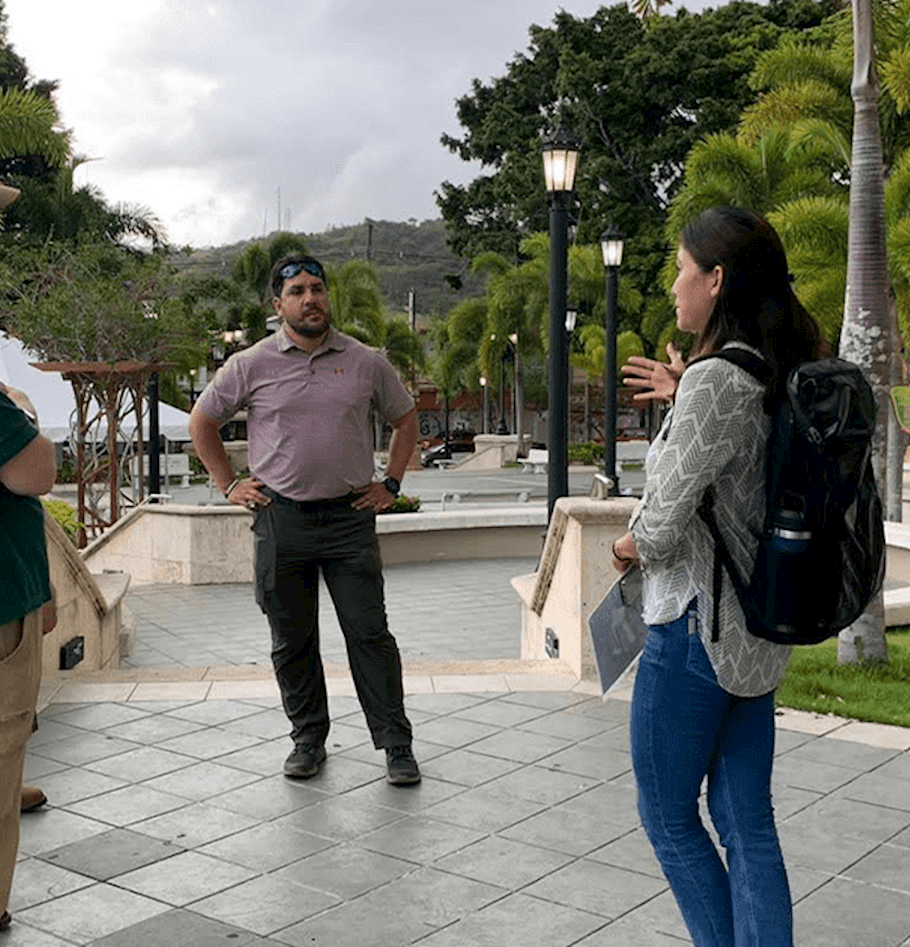Teaching computer literacy without computers
As part of West Monroe’s Fischer Global Service Fellowship Program, I am spending several months in Ghana teaching IT literacy. This blog shares the unique experiences and insights I’m gaining in my time working in these communities helping local schools improve their IT infrastructure and education.
The Aboom Methodist School is the leader in IT education in Ghana. But what does it mean to be the leader
Each day in Cape Coast, Ghana, students from schools around Cape Coast central will travel to the Aboom Methodist School for computer literacy education. The classroom is small, approximately 12’ by 30’, and consists of a hodge-podge collection of computer and networking hardware. Of the 30 laptops and desktops, approximately 15 function properly, and the rest have been retired for spare parts. Of the 15 functioning computers, most are in need of reformatting, and each has its own collection of software and external hardware devices.
And yet even with computer hardware, the school experiences daily rolling power outages, and students are more often than not unable to use the computers. There are a handful of UPS boxes, which will provide power for a few desktops for an hour or two during a power outage, and there are two laptops that have functioning batteries. During classes when there is no power and the UPS boxes have been exhausted, computer literacy is taught on a chalkboard. Assignments may include exercises to draw the computer desktop, or to explain step-by-step how to open a computer program. And when the power is on, students must pay a lab fee of approximately 7 cents USD to assist the school to pay the electrical bill, as the federal government doesn’t provide financial support for IT education.
But utility problems and a lack of proper computer hardware are only the beginning of the problem with teaching computer literacy. Larger issues, which take root in endemic poverty in the developing world, stand in the way of education more generally. When students attend school many must work during weekdays by selling foodstuffs on the street to support themselves or their families. They are often exhausted because they continue to work long hours after they travel home from school. Some students as young as 12 years old must support themselves, and will sleep on the street in the evenings. Furthermore, school teachers are often the first to intervene with issues such as child prostitution, child pregnancy, and child abuse.
Currently, Ghana is also in the middle of a national strike, which includes teachers, doctors, nurses, and other public servants. Because of this, public schools have shut down for an indefinite period of time. However, this has provided an opportunity to travel and teach at private schools in the greater Cape Coast area. I was introduced to one such school, the Pathfinder International Academy, by my current neighbor. The school, although private, is a no-fee school, and was created for the orphanage at which my neighbor works. He and two other Ghanaians support the orphanage of 25 children with donations from the surrounding communities, help from volunteers, and small fees paid by local families who can afford to send their students to the Pathfinder International Academy.
The school, perched atop a remote hill accessible only by dirt roads, consists of a few wooden shacks and one unfinished cement structure, which previously collapsed while the students were on a break. Here, computer literacy is taught in an open-air classroom on a chalkboard for every lesson. But the Pathfinder International Academy is the educational norm for computer literacy education in Ghana. Of the 8 public and private schools I’ve traveled to during my time in Ghana, none outside of Aboom have computer hardware. And of the teachers and young adults to whom I’ve spoken, none were fortunate enough to have computer hardware at their respective schools.
Creating Sustainable IT Education Centers
Collectively, larger macroeconomic, cultural, and political factors create a challenging environment for Ghana as it continues to drive education initiatives. And although money alone cannot solve the problems that face Ghana’s education system, it can cure acute ills, and specifically those which stand in the way of increasing computer literacy in Ghana. Even the best teachers cannot successfully teach computer literacy without a computer. And accordingly, the goals we have set with the schools, teachers, and the surrounding communities, are two-fold:
First, we will continue to improve upon the IT center at the Aboom Methodist School to enhance its reputation as the leader in IT education, and to make it more affordable for local area students from other schools. To do this, we will begin by addressing the school’s most immediate needs: creating an affordable backup power supply; constructing a new IT center to both protect the computers from the open air, and to provide space and hardware for students in the classroom; and to standardize software and hardware to ensure students receive fluid and consistent education during classroom sessions. We are also working to identify a reliable internet service provider, with a long-term goal of creating an internet café for the community to generate revenue for the school.
Currently, contractors are approximately two weeks away from the completion of the building. Once finished, we will purchase new furniture, a UPS to power the center during electrical outages, and new computer hardware, with the goal of having one computer for every student at Aboom.
Second, we will work with local schools that cannot travel to Aboom to ensure they are better prepared to teach computer literacy. For most schools, this change is groundbreaking; it includes providing electricity for students who don’t have electricity in their own homes. Further, we have set a goal of one computer, projector, projector screen, and UPS to each school so that every student has the opportunity to learn computer literacy with a computer.
Currently, we have purchased electrical supplies and enlisted contractors to begin the electrical work for two schools, one of which will commence this weekend. We are also working with the utility companies to estimate the total annual utility cost for each school to ensure we provide the resources to sustain the IT education centers. More interestingly, other no-fee private schools have echoed a sentiment that they may be able to generate revenue by creating an IT center, as parents would be willing to send their children to these schools for a fee if the school were able to provide IT education with computers. We will continue to work to identify whether providing electrical connections, computers, and projectors to these schools is a viable option.
Taken altogether, there is an ambitious list of projects in flight. But thanks to the donations and hard work of the West Monroe Partners team, we are well on our way to creating sustainable, affordable, and impactful change to the Cape Coast community!

